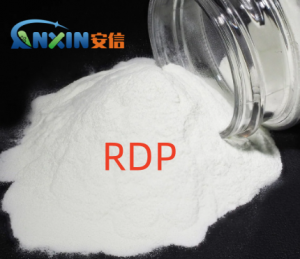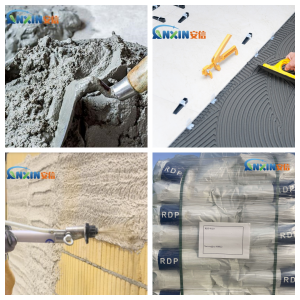Redispersible polymer powder (RDP) is a free-flowing powder formed by spray-drying an emulsion. Upon contact with water, it rapidly redisperses to form a stable polymer emulsion with properties similar to the original emulsion. As a polymer additive, RDP is widely used in building materials, adhesives, coatings, caulking compounds, and other fields, playing a vital role in improving product performance and construction results.
1. Applications in Building Materials
The construction industry is the most widely used application for RDP, particularly in dry-mix mortars. Its main uses include:
Tile adhesives: RDP can significantly improve the bond strength and flexibility of tile adhesives, maintaining excellent bonding properties in high and low temperatures, as well as in humid environments. Putty Powder and Exterior Wall Insulation Systems: Adding RDP to putty enhances water resistance, weather resistance, and adhesion. In exterior insulation systems (EIFS), RDP improves the bond between the mortar and the insulation board, while also increasing crack and impact resistance.
Gypsum-based or cement-based mortars: RDP improves the mortar’s water retention, workability, and flexural properties, preventing cracking and extending its service life.
2. Role in Self-Leveling Floors
Self-leveling materials require excellent flow and abrasion resistance. RDP’s roles in these areas include:
Increasing adhesion to the base layer to prevent hollowing or flaking.
Increasing compressive and flexural strength for increased floor durability.
Improving construction workability, ensuring uniform slurry flow and a smooth surface.
3. Uses in Waterproofing and Repair Mortars
RDP’s excellent flexibility and film-forming properties make it a valuable modifier for waterproofing mortars. In waterproof mortar, RDP improves the impermeability and flexibility of the waterproof layer and strengthens the bond between the mortar and the substrate.
In repair mortar, RDP improves crack resistance, ensuring a strong bond between the repair layer and the original substrate.
4. Application in Tile Grout
Tile grout requires water resistance and crack resistance. The main functions of RDP in grout are:
Improving the bond between the grout and the tile, preventing cracking and peeling.
Providing good water and mildew resistance, ensuring long-term decorative effects.
Improving workability, making the grouting smoother and less susceptible to shrinkage.
5. Application in Integrated Insulation and Decoration Systems
With the increasing demand for energy-saving buildings, RDP plays a vital role in insulation and decoration systems:
Improving the overall weather resistance and bond strength of the system.
Enhancing impact resistance and crack resistance, ensuring long-term stability.
Assisting in bonding with various substrates (such as EPS and XPS boards), ensuring the overall performance of the insulation system.
6. Applications in Adhesives and Sealants
In addition to building mortars, RDP is also used in industrial and household adhesives and sealants.
In wood and paper glues, RDP provides excellent adhesion and durability.
In sealants, RDP provides elasticity and water resistance, extending service life.
7. Applications in Coatings and Modifications
RDP can be used as a modifier in paints and powder coatings:
Provides good film formation and weather resistance.
Improves alkali resistance and scrubber resistance, making it suitable for exterior wall coatings and functional coatings.
Improves adhesion between the coating and the substrate, preventing detachment.
8. Comprehensive Advantages of RDP
The wide application of RDP in various fields is primarily due to the following advantages:
Strong redispersibility: Reverts to an emulsion upon contact with water, facilitating storage and transportation.
Versatility: Simultaneously improves adhesion, flexibility, crack resistance, and water resistance.
Workability: Improves the workability of dry mixes and enhances ease of handling. Widely applicable: It can be used in a variety of systems, including cement-based, gypsum-based, and lime-based systems.
As an important polymer modifier, RDP has become an indispensable additive in the construction chemical industry. It plays a significant role in a wide range of applications, including tile adhesives, self-leveling screeds, exterior wall insulation systems, waterproof mortars, caulking agents, coatings, and adhesives. By improving adhesion, flexibility, water resistance, and weather resistance, RDP effectively enhances the performance and service life of materials. With the development of green and energy-saving building materials, the application areas of RDP will continue to expand, and its role in the future construction industry will become even more important.
Post time: Sep-10-2025

